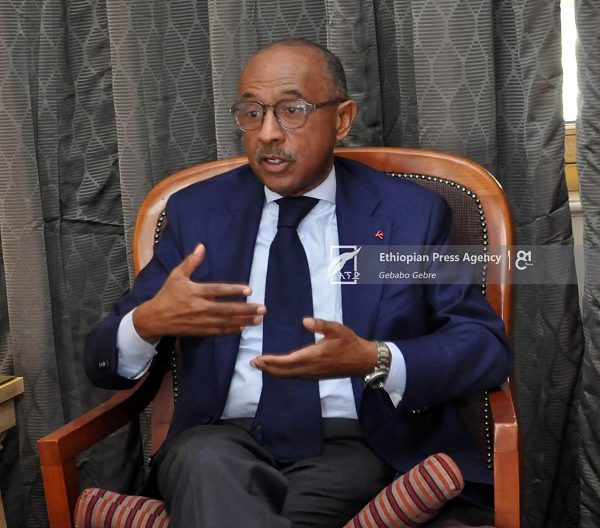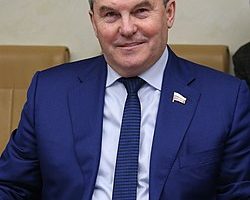
BY WORKU BELACHEW
Today’s Herald Guest is Mr Gabriel Nigatu. He is a Senior Fellow at the Atlantic Council Africa Center, where he is responsible for matters relating to the Horn of Africa, East Africa region. Currently Gabriel lives in the United States, Washington DC. He regularly advises governments and corporations on matters of economic reform, good governance, and regional integration.
Gabriel Negatu completed advanced studies at major institutions including the University of Pittsburgh, the Harvard University School of Business, and the University of Manchester. He is a widely sought-after speaker and strategist, serves on several boards, and is featured in leading publications on Africa.
The Ethiopian Herald has held a brief stay with him recently on current national issues of the country. Have a nice read!
Let’s start with the peace accord that was signed in Pretoria, then the implementation declaration that was signed in Nairobi, how could this promote peace in Ethiopia? And what should the international community do to consolidate this move?
The peace accord that was signed both in Pretoria and then later in Nairobi is a significant milestone in ending the conflict in the northern part of Ethiopia. First and foremost, we have to acknowledge that guns are silenced. Today, no guns are being fired, and no lives are being lost, that in itself is a major milestone. This is a region that has seen a lot of conflicts and is ravaged by war and famine and COVID. Unfortunately, every other disaster you can imagine has visited the region. So this peace accord must put an end to the conflict, there are no more combatants, lives are not being lost, and mothers in Tigray and Amhara and Afar can go to sleep, knowing that their children are not being recruited to war. So this in itself is a significant milestone.
Then what needs to happen next is a very critical issue because, for the longest time, the international community was very actively pushing and pursuing and aggressively. Now peace has come. Finally, peace is upon us. Now it is time for the international community to play their role in sustaining this peace. The signing of the accord doesn’t necessarily mean peace has come. It is just an intent to have peace. It is the first step towards peace. The implementation on the ground is what makes peace a reality.
The international community should acknowledge that implementing the accord in Pretoria and Kenya requires a lot of resources, human, financial, and material— all types of resources. Of course, first and foremost it is the government and people of Ethiopia that are responsible for sustaining the peace. And I think we can say this government is doing everything, everything possible to bring about the implementation of this peace accord. But it has limited capacity, like all countries.
Therefore, the international community needs to step in with the required support, be them technical, financial or material, this is needed to embed peace in the community to have its root on the ground to help with the demobilization and reintegration of soldiers, create livelihoods for those who were caught in the fighting, there is a whole range of things that generally happen in stages. First, you demobilize then disarm and then reintegrate.
The international community must work alongside the government, not in front of it, not dictating what needs to happen but working to help the government design and implement its agenda. This is an African solution to African problems. The government has a very clear roadmap and what is expected of them is to help implement that roadmap. That’s what the international community should do, in my view.
I think one of the achievements that were highly promoted is the rallying cry ‘African solution to African problems. What is your take on this?
Well, so far, the principle of African solutions to African problems has been at play. We, of course, take note that this peace was mediated by three Africans, Former President of Nigeria Obasanjo, former president of Kenya Uhuru Kenyatta and the former deputy president of South Africa Phumzile Mlambo-Ngcuka, of course, under the auspices of the African Union. So this is very much an African-led exercise.
Having said that, though, I should note that US and IGAD, were also there, as observers, I am told sometimes, observers go beyond observing and try to advise and so on. But overall, on balance, I think this was an African-led initiative. Now, being African-led doesn’t mean it is exclusively African. It just means you let the Africans develop a strategy, a roadmap based on African wisdom, experience and know-how. No one knows Africa better than Africans themselves, the US, or former colonial powers cannot act on behalf of Africans. But, once that agreement is reached, the IC has to work with Africa.
Another interesting point is that the African solution does not mean it is solely Africans that put the agreement to full implementation. It means at some point that Africans will lead and at other points, the international community will come in to support them. So it’s a partnership. It’s a shared initiative. And I think the time has come, the time has come for the world’s community to step up and play its due role in support of an African-led; African conceived initiative.
What is expected of the government of Ethiopia in particular, may be requesting local and international partners to involve in the reconstruction and other processes.
Right. What is expected of the government first and foremost is leadership. I think Ethiopia has shown incredible resilience and leadership, even when it was being pushed and challenged and so on. It has held its ground and has shown tremendous leadership— leadership in bringing peace, and leadership in implementing the peace accord. That means, now that peace has come, demobilization camps have been set up, and soldiers are already moving in there and surrendering their arms and so on, those are the first steps. But the kind of leadership that is required is to rebuild the region. One has to remember, it’s not only Tigray that was affected by this conflict, Amhara and Afar are also were devastated by the impacts of the war.
So, the government of Ethiopia needs to take the lead in doing an impact assessment. What has been the damage the war posed? Who was affected, and in what way? How many schools were destroyed? How many hospitals? How many lives are affected directly and indirectly? How many young women were raped and victimized? …All these need a thorough and careful assessment. Put another way, it is incumbent upon the government to conduct a study on the human, financial, economic, material, and psychological impact of the war. The next phase is costing. That requires, again, very sound technical knowledge of the cost of the stated impacts. Then comes financing.
As I said earlier, the primary responsibility for financing the reconstruction is with the government of Ethiopia. I can tell you from my discussion with people here that the government is spending billions of dollars on the reconstruction effort. Already the demobilization has started, which costs a huge amount of money, putting people back to their localities (Qeyes), wherever they came from, giving them what they need to restart their life.
That costs a lot of money. And the government is already putting in a lot of its resources. This is putting tremendous stress on the Ethiopian economy because this is again an unbudgeted, unexpected financial burden on the economy. Nevertheless, the government is moving forward with implementing that with its own money. At the same time, the government needs to reach out to the international community, and get a well-developed, impact assessment and types of projects and services to be provided. You need to reach out to the international community to say ‘this is the impact that we have suffered from. And these are the kinds of things we need to rebuild communities, households, families, regions, facilities, and so on.’
Do you think the government would reach out to the IC anytime soon?
My guess is once they complete the impact assessment; the government will convene what you call a donor, or a partner’s pledging conference, where you invite all the friends of Ethiopia to the table to walk them through the damage, impact and cost. Then, it asks partners to pledge financial, technical and other support to the effort that ongoing which is led by the government. So when it’s ready, I am convinced it will convene a donor conference to help mobilize the resources in addition to the domestic resources that are being mobilized in the country.
What role should personalities like you play in urging the IC for the said purpose?
I think all of us need to call on the international community, all of those who were lamenting the lack of peace, now peace has come. It is high time for these entities to be able to step up their support to the implementation of this peace process. Peace is here to stay but to make the peace a lasting one, it behoves members of the IC such as the European Union, the US, Russians, the Chinese, Turks, the Indians, the Middle East, the African neighbours… to throw their supports behind the efforts of Ethiopia.
I would like to urge the UN and all its specialized agencies that used to mount complaints saying they were not able to deliver food into the country. Now is the time to demonstrate whether or not their calls are genuine. As we speak, there are now three to four channels so that they deliver whatever aid they want to supply. Can I say it this way? Let us see if you deliver the food that is required.
Maybe there are some peace spoilers; they’re trying to sabotage the peace process in Ethiopia. This could be politicians of a certain country or ‘paid activists’. How should the IC respond to these kinds of peace-spoiling entities?
You know, every negotiated peace always has its detractors. A negotiated peace is about giving and taking. You had a situation by the time the government of Ethiopia and the TPLF were negotiating that the Ethiopian defence forces were a few kilometres outside of Mekelle.
That was the best solution at the time. And the representatives of the TPLF in Tigray were wise to acknowledge the reality on the ground and agreed to a peace deal. Is it 100 per cent perfect? No, there is no such thing as called 100 per cent perfect peace deal. But it was the best at the time. Now, there will always be this, especially in the diaspora, sitting in the comforts of the Western capitals, in the cafes and what have you and saying “no, we should keep fighting”. But when they say “we”, it doesn’t refer to them, it means the children of the poor and the farmers and so on, who are losing their lives due to the conflict.
I think the IC should call them out for they are warmongers, they are peace spoilers. And the people of Tigray have embraced this peace process. You have seen it, we have seen them being interviewed by local and international media, about how they welcome the peace agreement and so on.
So the attention should be to the people on the ground, it should not be the people in London and New York and Washington DC and Brussels. For them, prolonging the conflict is just a business. Peace has already come, people have embraced this, and the rest of Ethiopia has embraced it. The international community should embrace it wholeheartedly, without any equivocation any qualification. This is an organic peace negotiated and finalized by Africans. And there’s no reason to go back. And anyone who wishes to take us back is simply profiting from the conflict in the region, and the IC should not pay any attention to these entities.
Last but not least on my side, let’s talk about self-reliance. Ethiopia has been embarking on different kinds of projects that are meant for self-reliance, we can take, as an instance the low-land wheat production. How should these get support from relevant entities?
Thank you for that question. Self-Reliance is a goal that you set for yourself and you work towards this end. The fact that you seek Self Reliance doesn’t mean you don’t need support today or tomorrow. It’s a vision. And I think what we see in Ethiopia is that the Prime Minister has set that vision for the country. He has said we will become food self-sufficient. That is a goal. Now, will we achieve it this year? Will we achieve it next year or the year after? That should not be the issue. Some people will say oh, he said ‘Self Reliance’ last year, and we’re still importing wheat, so it’s a failure.
No, that is not how you measure a vision. Vision is measured in years, not months and dates. Ethiopia has said it intends to become self-reliant, food self-sufficient meaning it will not import basic food commodities for its people. This is a country of 100 and 120 million people. You do not become self-sufficient and feed 120 million people two times three times a day in one year or two years. But the process has been started, the train has left the station, the policy on the ground is there, and you see the Prime Minister visiting these huge mechanized farms.
These are the building blocks of what self-reliant food sufficiency will look like. But it will take time. So let us not rush to measure and judge this vision in one year or two years. Let’s give it the time it needs. What’s most important is ‘ Are we moving in the right direction?’ You know, if we were producing 100 million tons last year, are we producing 700 million tons this year? Are we are producing one billion tons next year? Those are the steps towards achieving food self-sufficiency in 1 year, 2 years, and 3 years, which, in my view, it is immaterial, it’s inconsequential. Get there in one year, if things work out. If the rains don’t come, you may not.
And the price of fertilizer around the world goes through the roof, you may not. Here there are factors outside of your control. If the war in Ukraine has increased the cost of fuel and fertilizer, how can you control that? Therefore, if you don’t achieve food self-sufficiency, does it mean you fail? No. These are what you call exogenous factors outside of your control. But the policy is that the investment is being made in the right direction.
Thank you very much, Mr Gebriel.
The Pleasure is mine.
THE ETHIOPIAN HERALD 24 DECEMBER 2022





